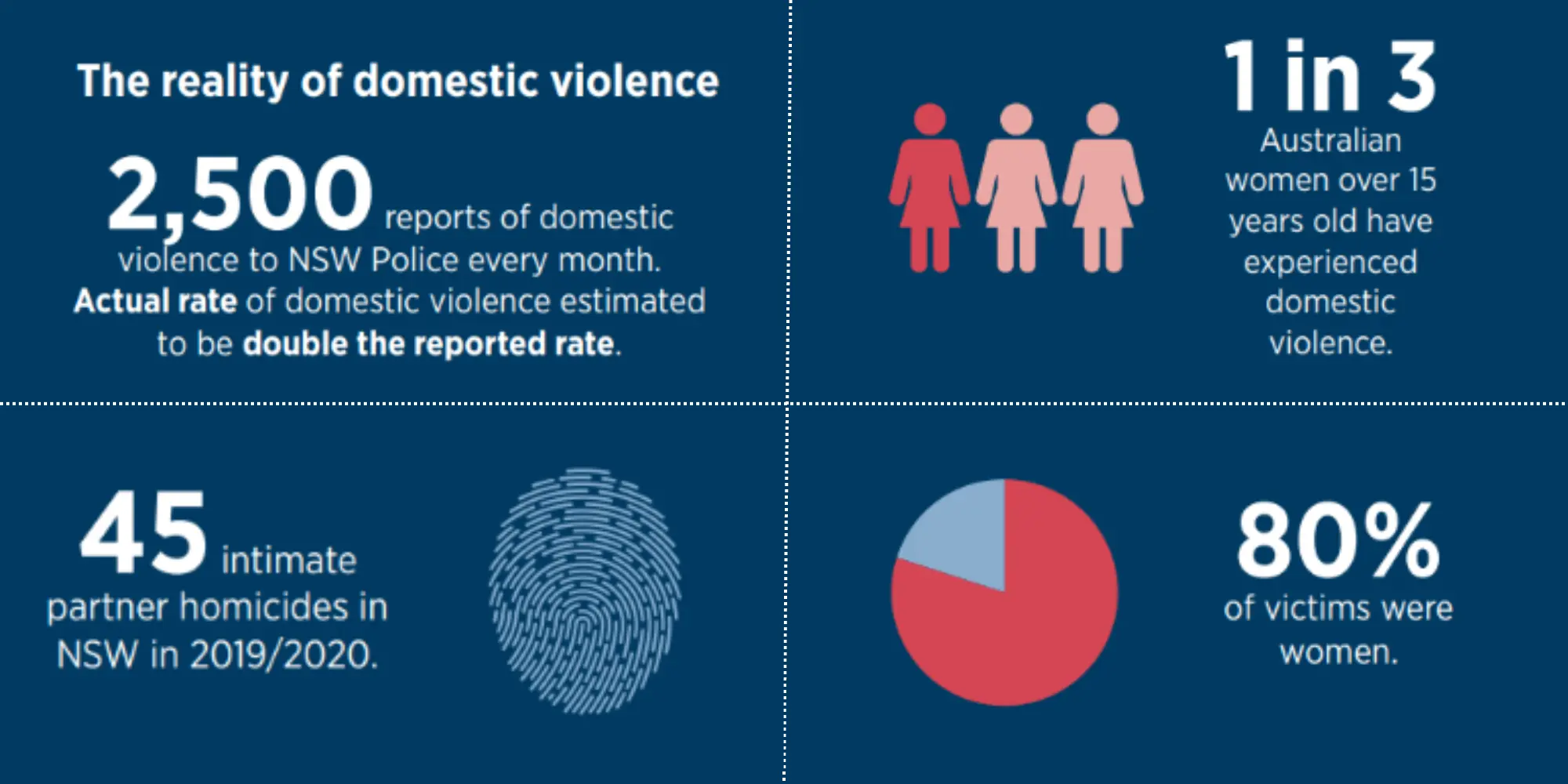Domestic violence is a persistent problem in our community that impacts people from all walks of life and cultural backgrounds across New South Wales. As it’s an issue tied to a person’s residence, property managers play a key role in ensuring safe outcomes for tenants and the stable management of assets for landlords.
Lachlan Malloch, Director at the Office of the Property Services Commissioner, said that the vision of the Commissioner is to have an industry that is trusted, empowered and accountable – and this is especially relevant in property managers’ approach to dealing with circumstances of domestic violence.
“I think these three attributes – trusted, empowered and accountable – are essential in delivering the best outcomes when dealing with these difficult situations,” Mr Malloch said. “You need to have a trusting relationship with tenants and landlords, the support to do your job well and with confidence, and hold yourself to a high ethical standard to ensure legal compliance at all times.”
NSW Government committed to reform
Following a 2016 review that determined previous laws were not sufficiently protecting victim-survivors of domestic violence, new laws were introduced in 2019. These laws provide several pathways for a person to escape domestic violence, including the option to use a Domestic Violence Termination Notice to end a lease immediately and not incur a financial penalty.
Corena Sloper, Manager of Real Estate and Housing Policy at NSW Fair Trading, said these laws aim to make it easier for victim-survivors of domestic violence to leave quickly.
“The decision to leave often requires careful planning and a tenant may only have one chance to escape, which is why immediacy is so important,” Ms Sloper said. “Not being bound by financial obligations means tenants aren’t forced to stay trapped in a violent home and can secure new accommodation more easily, which reduces the risk of homelessness.”
Always refer to the tenant by their first name when speaking to the landlord. This means when issues arise, the landlord isn’t thinking about an abstract idea of ‘the tenant’, but rather is visualising a human family Always refer to the tenant by their first name when speaking to the landlord. This means when issues arise, the landlord isn’t thinking about an abstract idea of ‘the tenant’, but rather is visualising a human family.
– Alexandra Haggarty, First National Real Estate Maitland
Effect of a Domestic Violence Termination Notice
A Domestic Violence Termination Notice must be provided to the property manager or landlord and co-tenants. This notice must include evidence of the circumstances of domestic violence.
“It’s important for property managers and landlords to remember that they can’t use or disclose any details of the Domestic Violence Termination Notice or attached evidence,” Ms Sloper said. “These documents must be kept secure and failing to do so is a breach of the law.”
A person who ends a tenancy with a Domestic Violence Termination Notice isn’t liable to pay any compensation or additional fees for early termination of the lease. This includes break lease fees, advertising costs or occupation fees for abandoned goods. Perpetrator co-tenants are responsible for the full rent and any damage to property as a result of a domestic violence incident.
Challenging a Domestic Violence Termination Notice
It’s possible for a property manager, landlord or co-tenant to challenge a Domestic Violence Termination Notice, but the NSW Civil and Administrative Tribunal is only able to review whether the notice was given in accordance with the procedural requirements in the legislation.
“The contents and evidence of a Domestic Violence Termination Notice can’t be reviewed by NCAT,” Ms Sloper explained. “If the notice is incomplete or the tenant didn’t attach relevant evidence, you can challenge the notice, but NCAT has discretion to disregard any technical defects in the notice if it thinks it’s appropriate to do so in the circumstances.”
The role of property managers
Alexandra Haggarty, Managing Director at First National Real Estate Maitland, has helped more than 200 families find new homes over the past eight years in partnership with a domestic violence support service provider. She knows first-hand the important role a property manager has in ensuring best outcomes for tenants and landlords.
“Humanising the tenancy is best practice for property managers and it makes situations like domestic violence or other issues easier to navigate,” she said. “Always refer to the tenant by their first name when speaking to the landlord. This means when issues arise, the landlord isn’t thinking about an abstract idea of ‘the tenant’, but rather is visualising a human family. This makes it easier to work together to find a solution.”
Ms Haggarty said property managers who suspect a tenant is in domestic violence circumstances should be mindful of their personal safety and that of the tenant.
“Remember that you aren’t a caseworker and the best thing you can do is let the tenant know what their options are and support them in the decision they make,” she explained.
“Agents should limit their involvement in the situation and be careful not to put themselves or the tenant in danger. The tenant may be monitored financially, digitally or in other ways – so don’t communicate your concerns or provide the tenant with any information about support services via email or text message unless they give consent, because you could be putting them in danger.”

Case studies
Noise complaints
Several noise complaints have been made about heated arguments between male and female tenants, and the neighbours have reported seeing the male tenant taken away by police. The female tenant denies that she is experiencing domestic violence, but you have serious concerns about her safety.
In this situation, Ms Haggarty said property managers should approach the situation without making a judgement call about what the female tenant should do.
“If there’s an imminent risk of danger to anybody, then the appropriate action is to contact police by calling 000,” she said. “If there’s no imminent danger, then the best thing to do is have a conversation with the tenant you are concerned about.
“It’s important that you make sure the conversation is private and the tenant won’t be overheard. Give them the opportunity to come to you at a time that is safe for them.
“The support service 1800 RESPECT is the best starting point for anyone experiencing a violent relationship, but only send that referral through once you have the consent of the tenant.
“It’s important that you are understanding and not judgmental during this conversation. A person will reach out for support to change their circumstances when they are ready and when they know it’s safe for them to do so. They need to come to that decision for themselves and it may take a number of attempts or quite some time before they are ready to reach out.”
Reference request
You receive a reference request from a previous tenant, who ended their lease using a Domestic Violence Termination Notice.
Property managers must remember that all information about the Domestic Violence Termination Notice and supplied evidence must be kept confidential.
“I understand how difficult this is, but we don’t want a history of experiencing domestic violence to stigmatise an applicant and place them at a disadvantage when trying to seek a new home,” Mr Malloch explained.
“When a property manager is asked to provide a reference, they can’t divulge any information related to domestic violence. However, I don’t think that means they can’t say anything. You might say ‘the reason for the tenant leaving is confidential, but I can tell you about my experience of them as a tenant and how they performed during their tenancy’.
“I would encourage property managers to try and be as helpful as they can in terms of providing some form of character reference without compromising confidentiality.”
Ms Haggarty added that the only exception to this is if the tenant has given written consent for the property manager to disclose details of the domestic violence.
“There are circumstances where it is to the advantage of the tenant to disclose the domestic violence, particularly if they are applying to an agency with a program that actively seeks to lease properties to victim-survivors who have left circumstances of domestic violence,” she explained. “If the tenant, without feeling compelled to, wants to have that information shared as part of a reference and has put that in writing, then the property manager can disclose it.”
Two notices
Two co-tenants are both claiming to be the victim of domestic violence and both have submitted Domestic Violence Termination Notices with signed declarations by a competent person. This means the tenancy will end immediately for both tenants and neither will pay a break lease fee or any other associated costs.
Although this may feel like a difficult situation, the property manager must take both notices and evidence on face value. As long as the declarations comply with the law, they must be accepted – even if you suspect one of the tenants isn’t a legitimate victim. However, providing false or misleading information in a declaration is an offence, so if you believe this is what has happened, contact NSW Fair Trading and report it.
“It’s fairly black and white,” Ms Haggarty said. “If you have a valid Competent Person Declaration that complies with the law, then it stands and you need to follow procedure.
“I would encourage property managers to make a complaint to NSW Fair Trading if they suspect one tenant has been false in their declaration, because domestic violence support services believe this is an area that could contribute to further abuse and control of victim-survivors.”
Support services
1800RESPECT - 1800 737 732
Lifeline - 13 11 14
Beyond Blue - 1300 224 636
Webinar
The information in this article is drawn from an REINSW webinar – Domestic violence in tenancies
Members can find out more about how best to deal with tenants experiencing domestic violence by viewing the webinar at reinsw.com.au
